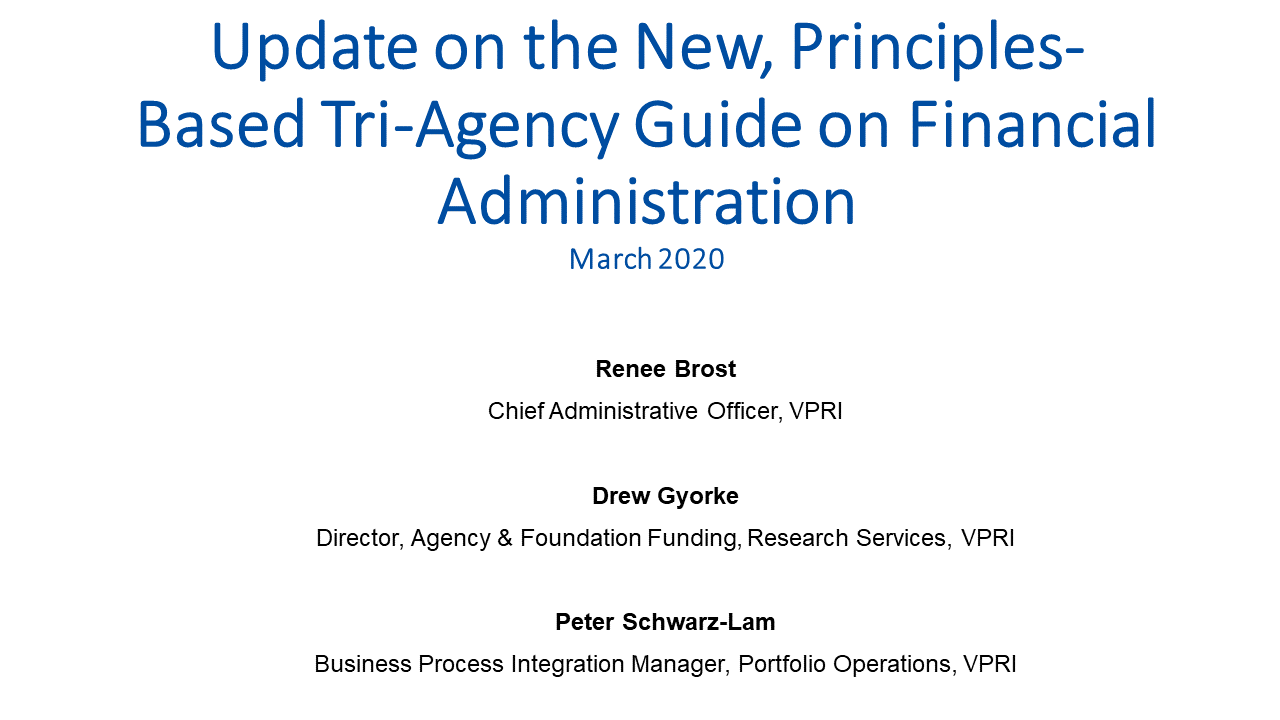Description
The Canadian Institutes of Health Research (CIHR), the Natural Sciences and Engineering Research Council of Canada (NSERC) and the Social Sciences and Humanities Research Council of Canada (SSHRC) launched a new, principles-based Tri-Agency Guide on Financial Administration (TAGFA) that took effect at the University of Toronto (U of T) on April 1, 2020.
This session is aimed at faculty (both current and prospective recipients of Tri-Agency grant funding) and their support staff and provides an overview of the Guide and information about the transition to a principles-based approach to the use of Tri-Agency grant funds.
Learning Outcomes:
- Understand the key differences between the new and old TAGFA, including the four principles and other important changes
- Understand the impact of the new TAGFA on the administration of Tri-Agency research funds at U of T
- Know what additional resources to consult for more information about the new TAGFA implementation
Key Takeaways:
1. Tri-Agency Grant Expenditure Assessment
The Tri-Agency Guide on Financial Administration (TAGFA) sets out four basic principles and a set of directives that collectively provides a framework governing the appropriate use of Tri-Agency grant funds. The appropriateness of a grant fund expenditure should be assessed against the following steps in order of precedence:
-
The program / funding opportunity description for that grant
-
The four principles
-
The relevant directive details
-
Applicable U of T policies and guidelines
2. TAGFA – ‘Effective & Economical’ Principle
In the new Tri-Agency Guide on Financial Administration (TAGFA), the principle of "effective and economical” does not always mean every expense should aim for the lowest cost; rather, the expense should achieve the intended outcome with due regard for minimizing cost. For example, if an item or service is inexpensive but can create undue burden on funded activities by causing lost time / effort or additional expenses elsewhere, that item or service is not necessarily effective and economical.
3. TAGFA - Expense Eligibility
When assessing expense eligibility, one helpful Tri-Agency Guide on Financial Administration (TAGFA) principle sets out that “goods and services must not be provided by the administering institution to their research personnel.” Keep in mind, however, that divisions can vary in what they provide to research personnel.

- Renee Brost, Chief Administrative Officer, VPRI
- Drew Gyorke, Directory, Agency and Foundation Funding, Research Services Office, VPRI
- Peter Schwarz-Lam, Business Process Integration Manager, Portfolio Operations & Budget, VPRI


